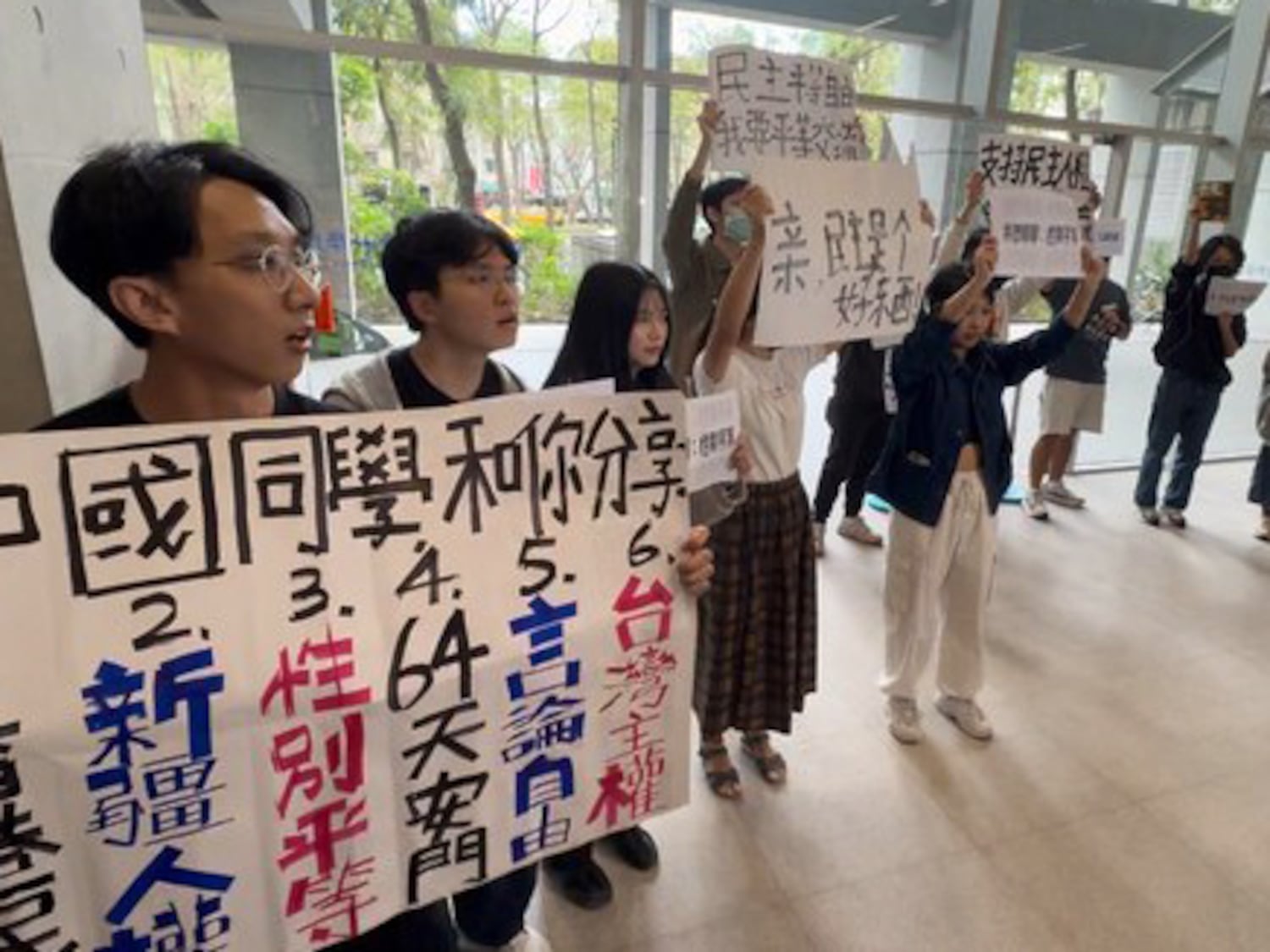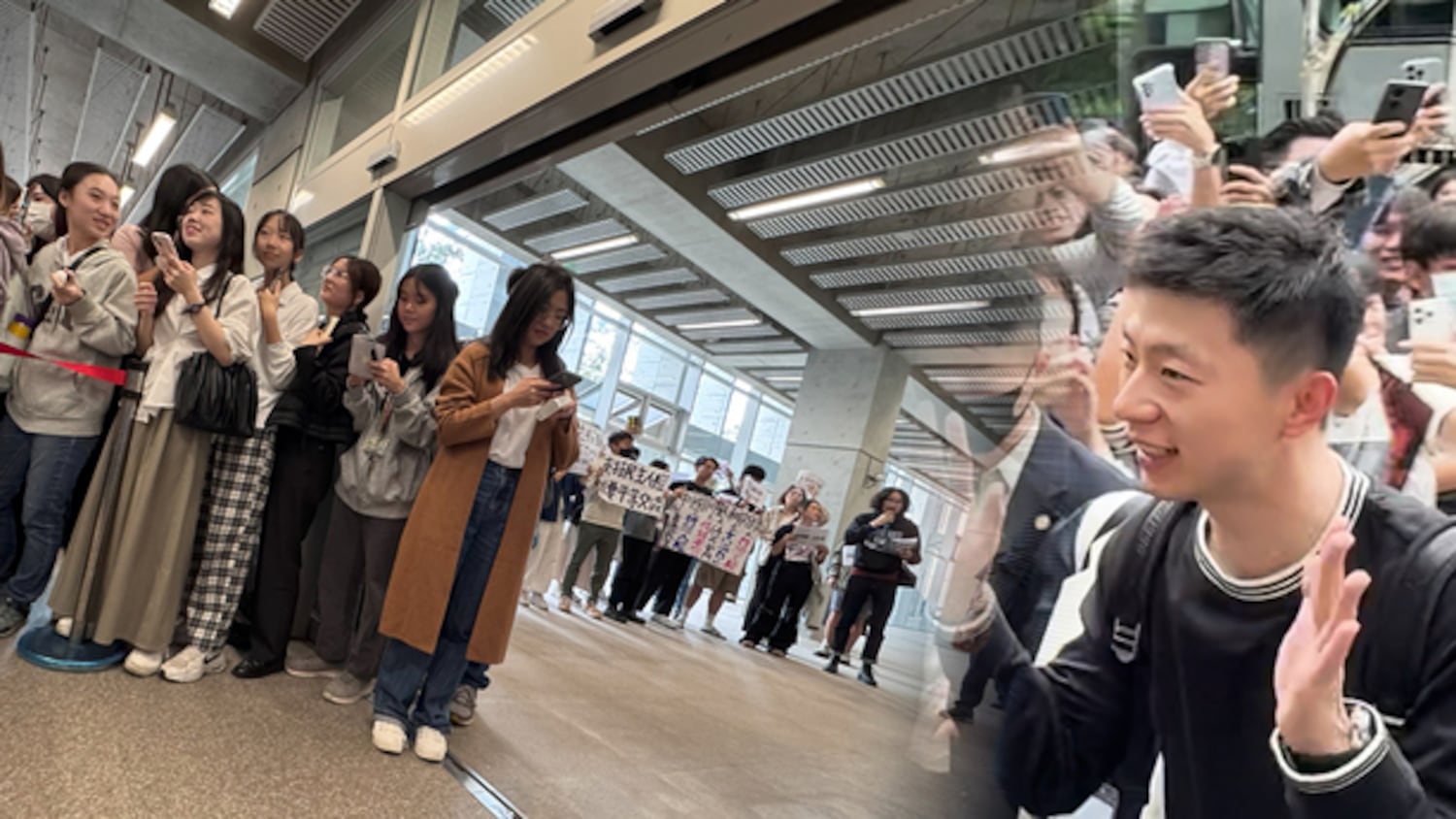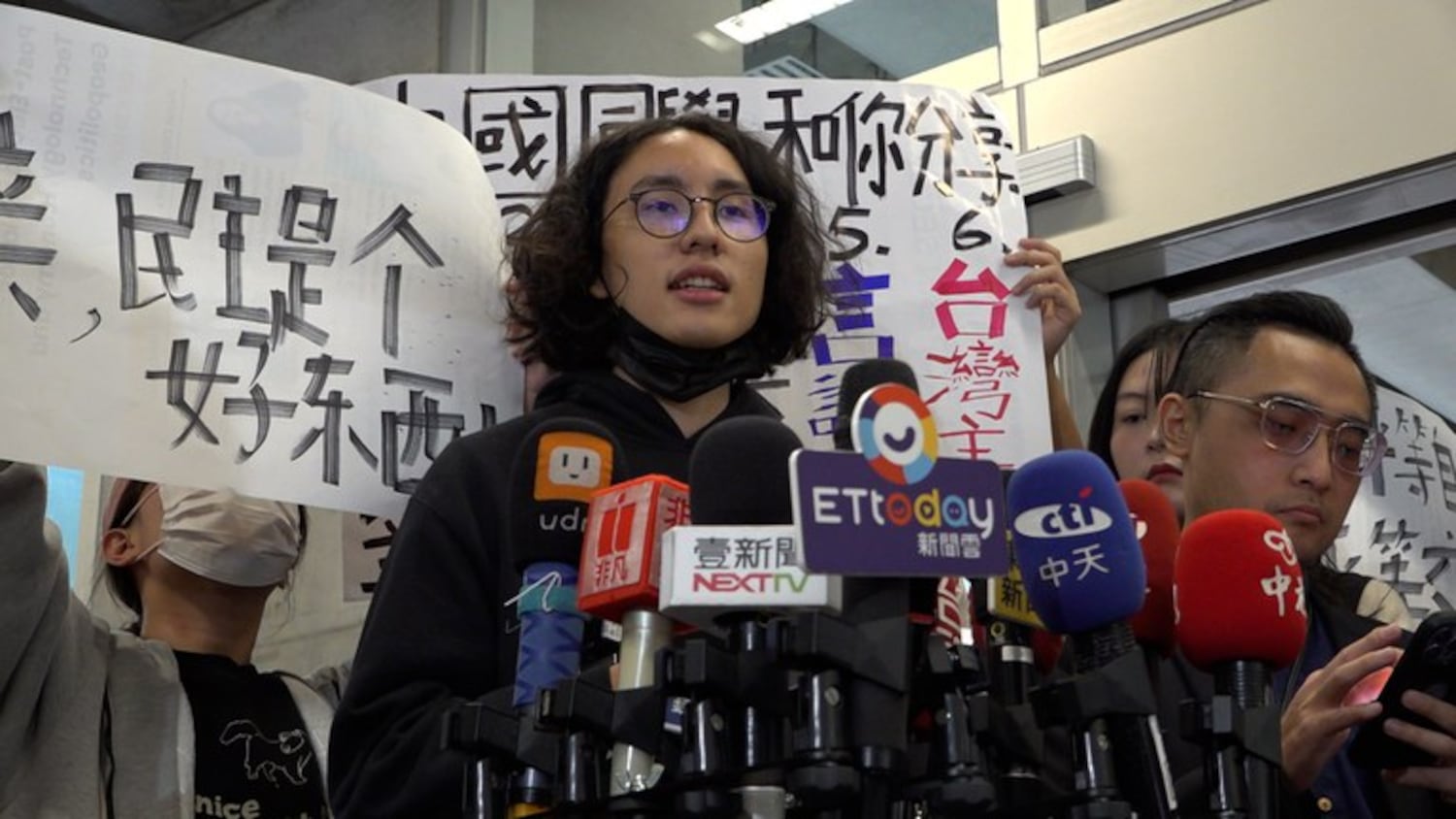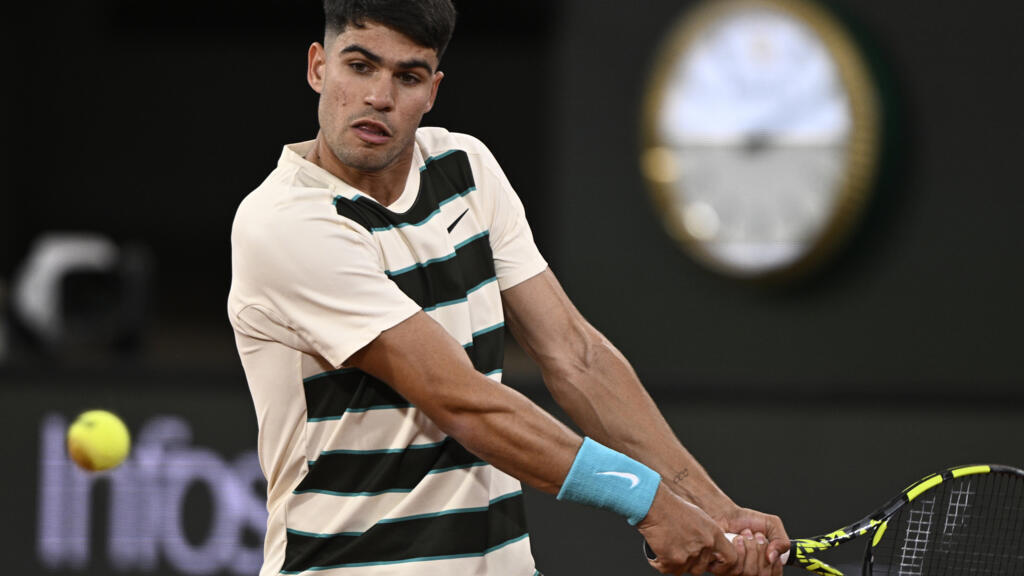Taiwanese students shout pro-democracy slogans at Chinese delegation
Students at National Taiwan University offer books on democracy to Chinese students, who refuse to take them.

University students in democratic Taiwan on Tuesday booed and held up pro-democracy slogans during a visit by Chinese table tennis legend Ma Long and dozens of Chinese university students.
The delegation is on a nine-day trip to Taiwan at the invitation of former President Ma Ying-jeou, who has been criticized by many on the island for getting too cozy with Beijing.
Around 70 people booed and held up protest signs as Ma entered the School of Social Sciences at National Taiwan University on Tuesday, with some holding up slogans in support of the 2019 Hong Kong protests and one holding the banned Tibetan snow lion flag used by supporters of Tibetan independence.
“Free Hong Kong! Revolution now!” read one placard, a slogan of the pro-democracy movement that has since been banned in Hong Kong under an ongoing crackdown on dissent under two national security laws.
“We support democracy and human rights, and we want exchange on an equal footing!” read another, in a reference to Beijing’s refusal of government-to-government contact with Taiwan and its denial of the island’s status as a sovereign nation.
Taiwan has never been ruled by Beijing, nor formed part of the People’s Republic of China, and is formally governed by the Republic of China government, formed after the 1911 fall of the Qing Dynasty under Sun Yat-sen, that later fled to Taipei after losing the civil war to Mao Zedong’s communists on the mainland.

While China insists on eventual “unification” with Taiwan, by armed invasion if necessary, the majority of Taiwan’s 23 million people have no wish to give up their democratic way of life to submit to Chinese rule.
China has threatened the death penalty for supporters of Taiwan independence, while Taipei says Beijing has no jurisdiction over the actions of its citizens. A recent public opinion poll from the Institute for National Defense and Security Research showed that 67.8% of respondents were willing to fight to defend Taiwan in the event of a Chinese invasion.
Student placards
Many of the placards were written in the simplified form of Chinese writing adopted by the Chinese Communist Party leadership since it took power in 1949.
“Democracy, freedom and human rights,” read one sign, while several people carried signs with the words “Chinese Taipei,” crossed out in red, in protest at the name used by Taiwanese athletics teams in international sporting competitions at Beijing’s insistence.
“Democracy is a good thing!” read another sign.
Ma smiled and waved at the protesters, while a delegation of Chinese students accompanying him had mixed reactions, with some moving forward with blank expressions and others smiling and waving back.
“The students of National Taiwan University care about a lot of issues, including democracy for Hong Kong, human rights in Xinjiang, gender equality and the June 4, 1989 Tiananmen massacre, and Taiwan’s sovereignty,” a protester who gave only the surname Huang told the gathering.
“We want to share these concerns with the students from China, in the hope that they will learn an important lesson from their visit to Taiwan,” he said.
Students also tried to gift books in Chinese about democracy in mainland China and Hong Kong, but the Chinese students declined to accept them, likely fearing they were banned by the authorities back home.
RELATED STORIES
A tale of two National Days: Artists pick sides across Taiwan Strait
China’s Xi Jinping meets former Taiwanese president
Don’t display slogans, wear provocative T-shirts in Hong Kong, Taiwan tells citizens
Six-time Olympic table tennis champion Ma Long is on a nine-day visit to Taiwan through Dec. 5 “to promote friendship and exchanges between Taiwanese and Chinese athletes” along with 40 Chinese university students and faculty members, Taiwan’s Central News Agency reported on Nov. 29.
Ma Long traded a few strokes on the paddle with Ma Ying-jeou before engaging in a friendly match with Taiwanese paddler Chen Szu-yu and veteran table tennis player Chiang Peng-lung, the agency said.
‘Political elements’
But a Hong Kong student at National Taiwan University who gave only the surname Chai for fear of reprisals said Ma’s visit was likely a form of United Front exchange, part of the Chinese Communist Party’s attempts to win Taiwan over with “soft power” exchanges and influence operations.
“The trip may not seem on the face of it to contain political elements, but ... some of the Chinese students raised the Chinese flag a few days ago,” Chai said.
“All of these actions are a part of the Chinese Communist Party’s United Front agenda,” he said. “I think this is an image-building project.”

According to Taiwanese media reports citing intelligence sources, all of the delegation are either members of the Chinese Communist Party or the Communist Youth League.
Chairman of the main opposition Kuomintang Eric Chu, whose party advocates closer ties with China, defended the delegation’s visit last week, saying it would “strengthen the cross-strait relationship,” the Central News Agency reported.
Chu said it was unsurprising that the delegation were all members of Communist Party organizations.
Hsiao Hsu-Chen, who heads the Ma Ying-jeou Foundation which is hosting the Chinese delegation, said Taiwan is a free and diverse place where everyone is allowed to express their opinions.
Asked why the Chinese students weren’t allowed to interact with their Taiwanese counterparts directly, Hsiao said they weren’t allowed to deviate from the itinerary that had been approved by the government’s Mainland Affairs Council, which governs interactions with China.
Translated by Luisetta Mudie.
This article has been sourced from various publicly available news platforms around the world. All intellectual property rights remain with the original publishers and authors. Unshared News does not claim ownership of the content and provides it solely for informational and educational purposes voluntarily. If you are the rightful owner and believe this content has been used improperly, please contact us for prompt removal or correction.






.jpg?Expires=1840058149&Key-Pair-Id=K2ZIVPTIP2VGHC&Signature=i-8DoofzS5~jK8vXSpKAvxn2vo4QSeDVya2TT52vorT4swletygfxry2P5syfccNOcXIv0nRjr5RHKBFYCrKF7PG1pUIq9YkZIs8G2SrjR2QUX4WQ5e7H4vazVauf~EP4UrpPxmOF010PxadOhBW~L75NbsVPtCywEHvlSV5NjyTsMJF4MrgaqJbtVGvh8IJl9qN6wd5sR9z1TOEA1hbpXs~BgCHAkP3xVeJXjyjPlr3a8iUHwseuJ8u6lOEGIvsAqVuNY42CwaQkoCastk-7K4ELnmDLZLmBwM34IbJnwr4mbRorgI23vo~KoyfznKP3rr6bZx0K89X1ZNsqSKzZg__)

.jpg?Expires=1840063712&Key-Pair-Id=K2ZIVPTIP2VGHC&Signature=prWKBuGOVPmxZV7qoieG82omfyfXLNLusQT5Typ4zbMnoLIV6aiHAlN7iIgnSQp7xaSGOza-LcWjBiNPZDRz884yMYhfYFJPGW3lPk94WXQ0C2p~NrXnLe8ypnvUYOYMiw5cUswprSqc3-vUFFMbO5N8Mu4No3MYVkmEWCCQaOHFLTFfT4L~7G1xSV-9HrO~bvVUMcUmXa-vI526wCAwk8VWY4L1LP6s3I9dXbWUPkugoUGSCjCieR5bV2BffWCZdF0ZjYPdP8PdWTKG3Jygrdnv28XnOZp2JLgoTpLEopEJvOTe9U8PFoo1ZQTwGah4Y9ecfNUWhIa~oiprqjEXzA__)



